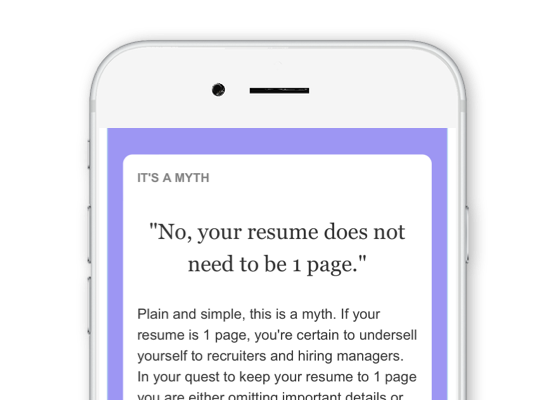Episode 116
Why your job search is not a numbers game and how this can delay getting hired
11 min listen
Episode 23
11 min listen

Listen to the Episode
Episode Summary
Playing the numbers game in your job search is not a good strategy because it leads to more rejections and less success. In this episode of the Career Strategy Podcast, we explore why quality over quantity is crucial in finding your ideal job. Host Sarah shares strategies and actionable advice to help professionals achieve career growth, fair compensation, and more impact.
Discover why applying to a large number of jobs can be detrimental to your mental health and overall job search experience. Instead, focus on building relationships, improving your career materials, and conducting research before applying to specific companies. Tailoring your resume, cover letter, and portfolio can make a significant difference.
Join Sarah in uncovering the common pitfalls of the numbers game and explore alternative approaches to job searching that yield better results. Find out why a targeted and strategic job search can save you time, energy, and frustration. Don’t miss this episode’s valuable insights on taking control of your career and finding fulfilling opportunities.
Create your dream career, and life
- Learn how to advance your UX career in our UX Career Roadmap
- Watch our free masterclass about the 4C framework to stand out in your UX job search
- Find out what’s included in our UX Job Search Accelerator Syllabus
Watch
Discussion Questions About The Episode
- Have you experienced any negative impacts on your mental health or personal life due to playing the numbers game in your job search? How might you address these challenges?
- What steps can you take to build meaningful relationships and establish a strong professional network during your job search? How might this positively impact your job search outcomes?
- Are you currently tailoring your career materials, such as resumes and cover letters, to match the specific job you are applying for? How might this improve your chances of getting interviews?
- How might prioritizing quality over quantity in your job search approach help you achieve a more effective and satisfying career outcome?
Episode Notes & Links
This episode is part of a 5 part series about the job search, check out the other episodes in the series:
- 🔎 Ep 21: The # 1 thing to do before you apply for a job
- 👥 Ep 22: Why you should prioritize people over platforms in your job search
- 🎲 Ep 23: Why you should NOT play the numbers game in your job search
- 🕵🏻♀️ Ep 24: How to research a company before you apply
- 😞 Ep 25: How to deal with rejection in your job search
Episode Transcript
Sarah Doody [00:00:00]: Hey there. I’m Sarah Doody, host of the Career Strategy Podcast. Many professionals are seeking more impact, flexibility, growth, and let’s face it, getting paid what they’re worth. But how do you unlock this in your career? It starts with strategy. I’m taking you behind the scenes of what’s working for my career coaching clients. You’ll hear strategies and actionable, yet sometimes against the grain advice for how you can be the CEO of your career. And stop dreading Mondays. Ready to level up your career? Let’s get after it.
Sarah Doody [00:00:38]: Hey there. Welcome back to another episode of the Career Strategy Podcast, and you’re joining us in the middle of our series All About the Job search. So today we will be covering the topic of why you should not play the numbers game in your job search. We’ve already talked about the number one thing you need to do before you ever apply to a job, why you need to prioritize people over platforms in your job search. And then in the coming episodes, we will talk about how to research a company’s culture before you ever apply so you’re not wasting time applying to places where you really wouldn’t be happy, and then how to deal with rejection in your job search, which is an inevitable part of the process for most people, let’s face it. All right, so today, why you should not play the numbers game in your job search. I have a lot to say about this, and the reason is that multiple times a week, people message me, email me and say, sarah, I’ve applied to 25 jobs, 50, 75, 100, 200, 400 jobs and not had a single interview. And I just wish to myself that they would have reached out to me after they applied to 15 jobs and not had an interview.
Sarah Doody [00:01:55]: And the way I look at it is that if you are not hearing back and getting interviews, that’s a yellow flag, a leading indicator that something is wrong. Now, where’s the problem? There’s really three places where the problem could be. The problem could be you are not applying to the right jobs to begin with. It could be your resume or it could be your LinkedIn profile, and we don’t have time to go into all of those components today. But if you are applying to jobs and not getting interviews, those are the things that you should be thinking about. And we’ll link to them in the show notes because we have some other episodes and resources related to those topics. But I wanted to bring those up because a lot of people just simply don’t know what to do if they’re applying to jobs and they’re not getting interviews. And so they Google or they ask around, and a lot of times people just say, keep applying, eventually it’ll work out, the numbers will eventually turn in your favor, et cetera.
Sarah Doody [00:03:05]: I just don’t buy into that. I think that playing the numbers game sets you up to have a longer job search than necessary, and it’s setting you up to be on an emotional roller coaster that doesn’t just impact your kind of work life. It can also impact your personal life, your friends, your family, your relationships as well. And I don’t want that for you. So here are the four reasons why I really don’t want you to play this numbers game in your job search. Because your career is not something that you should be gambling with, which is essentially what you’re doing when you’re just applying to more jobs, even though after 100 applications, you still don’t have any job interviews. So the first reason why you shouldn’t play the numbers game is that, like I said earlier, it’s a red flag that something isn’t working. You need to hit pause, and before you go and apply to more jobs, you need to do some detective work.
Sarah Doody [00:04:09]: And let’s face it, look at yourself in your resume a little more, maybe honestly and critically than you have been to figure out, you know what? Maybe there is a problem with my resume. Maybe I spent more time on the design of my resume than the actual words, the content. Maybe I followed that advice out there. Your resume would be one page. But in doing so, there’s a really strong likelihood that you’re selling yourself short, that those bullet points are just scratching the surface of what you’ve done. So if you’re applying to jobs and not getting interviews, that’s a red flag. Something isn’t working, and you should be going and trying to figure out what that is. In this case, making changes to your resume, applying and seeing what happens and kind of doing some experience.
Sarah Doody [00:05:01]: The second reason why I really don’t want you playing the numbers game comes down to time and energy, right? The time people put into applying to job after job. I’ve done multiple posts on LinkedIn where I ask people to comment with the math of how many jobs have you applied to in the last three months, on average, how long did it take you? Okay, now how many hours was that? And a lot of people don’t think like that. They don’t think to do the math. But when you do the math, you realize how much time that this application process is taking, and it can be really enlightening and eye opening. It’s not just the time, right? It’s the energy. It’s the mental energy. It’s the emotional energy that you’re putting into this activity of applying to jobs that is not having a good ROI return on investment, right? And the other kind of thing that relates to this component of time and energy. This is the third reason why I don’t want you playing the numbers game, which is, when you play the numbers game and you take up all that time, it leaves little to no time or energy to do other activities in your job.
Sarah Doody [00:06:19]: Search that are much more impactful and influential over whether or not you might get interviews. And you’re probably wondering, okay, Sarah, what are these impactful and influential activities that I could be doing that are more effective than just apply, apply, apply? Right. Here’s what it is. It’s about building relationships with people at the companies where you want to work. That’s one of the most high value things you can do. You could also be customizing or tailoring your resume, or that cover letter or that intro email, or a portfolio, if you have one, to the jobs you are applying to. But a lot of people resist this idea of tailoring and customizing the materials because they think, oh my gosh, that’s going to take me like 4 hours per job application, right? Not true. It doesn’t have to be that way.
Sarah Doody [00:07:17]: If your baseline resume, baseline cover letter, baseline portfolio are really awesome, then you can just duplicate that resume. For example, shuffle around the order of some bullet points, rewrite a few, change the little about me statement at the top of your resume maybe. And then voila, you have a customized resume for the job you’re applying to. And it took you ten minutes, literally. It could be that fast. So you don’t want to play the numbers game because it sucks up time and energy that you could otherwise be applying to these more impactful and influential activities like relationships, posting on LinkedIn to increase your visibility and customizing or tailoring these career materials. And the fourth reason why I really don’t want you playing the numbers game is honestly, because of your mental health. The job search can be really taxing emotionally and rightly so.
Sarah Doody [00:08:19]: Right. But here’s the thing. The more jobs you apply to by sheer numbers, the higher the chance you are going to see rejections. So if you know you are very prone to taking rejection negatively, to having that send you into a spiral of negative thinking and doubt and comparison with other people, maybe by not applying to so many jobs, that could help preserve your mental health, right? But if you’re applying to 200 jobs, you’re probably going to get a lot of rejections. And so instead of just applying applying? Applying. You need to be doing what we talked about a moment ago. Building these relationships, posting on LinkedIn, doing research honestly, before you ever apply to a company to figure out, if I was offered a job at this company to begin with, would it even align with what I’m looking for? What I refer to as your career value criteria, which we talked about in the first episode of this job search series. But if you’re applying to lots of jobs and not getting interviews, I want you to really think about what you could do differently after you’ve listened to this episode, what takeaways, what action items do you have for yourself? So it might mean let’s hit pause on applying to Jobs for the next week, and instead, let’s go look at your career materials, your resume, your LinkedIn profile, cover letter, email templates you’re using Portfolio, and figure out, is something off in how I’m talking about myself? Am I only scratching the surface? Could I be going into more detail? Should I make my resume two pages? Because there’s a very strong chance your one page resume is selling yourself short, or you bumped the font size down so small that no one can read it.
Sarah Doody [00:10:24]: So to recap the four reasons why I don’t think you should be playing the numbers game, first of all, it’s a red flag that something isn’t working, and you need to be listening to those clues to maybe go revisit your career materials. It’s also taking a lot of time and energy that is also impacting your life, right? It’s taking you away from friends and family and activities and the energy you would have to do other things that you want to do in your life. It also gives you less time to do more impactful activities in your job search, like connecting with people, building relationships, tailoring your materials, et cetera. And ultimately, for many of us, playing the numbers game can really set us up for some impact to our mental health, because rejection is hard to face, even if you are a positive, optimistic, kind of resilient person. So by applying to fewer jobs, but more of the right jobs, with the right career materials and the right relationships, you are far more likely to get interviews and not get sucked into this cycle of applying to jobs and jobs and more jobs. All right, I hope you found this episode helpful. If you did, I would really appreciate it if you could share it with a friend or tell your friends we have the job search series going on now, and depending on when you listen to this, you could potentially go binge all five episodes all at once. So coming up next episode, we have how to research company culture before you even apply to a job.
Sarah Doody [00:12:02]: And then finally, how to deal with rejection in your job search. I hope this was helpful. Thanks for listening to the Career Strategy podcast. Make sure to follow me. Sarah duty on Twitter, instagram. YouTube or LinkedIn? If anything in today’s episode resonated with you, I’d love to hear about it. Tag me on social media or send me a DM. And lastly, if you found this episode helpful, I’d really appreciate it if you could share it with a friend or give us a quick rating on Spotify or review on Apple podcasts.
Sarah Doody [00:12:37]: Catch you later.













